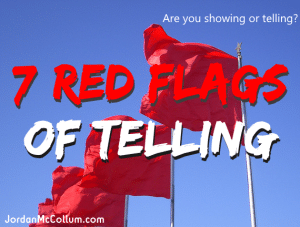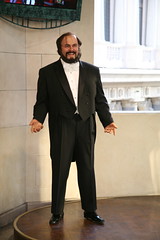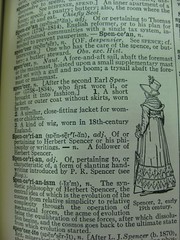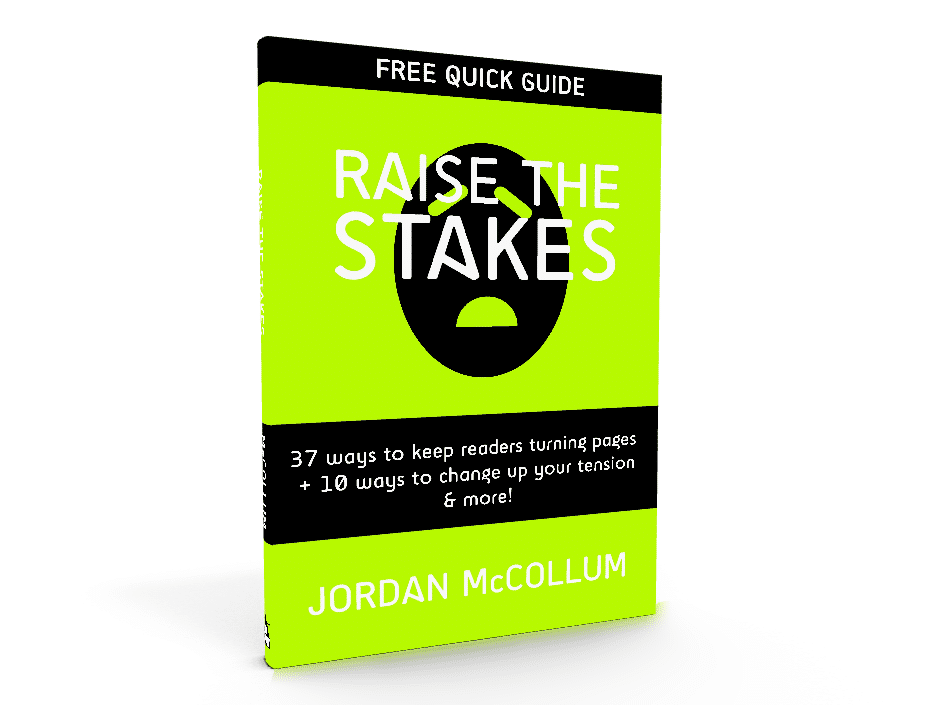Show, don’t tell: even in our narration, we want to show as much as we can, but sometimes we slip into a habit of telling when we could be showing. Now, these red flags of telling are all words and phrases that are  perfectly find, but in certain uses, they distance our reader from the character and the story. If we avoid these phrases, we can deepen our character’s voice and draw the reader into the story even more!
perfectly find, but in certain uses, they distance our reader from the character and the story. If we avoid these phrases, we can deepen our character’s voice and draw the reader into the story even more!
That’s why
Bringing up the past always made her angry. That’s why George had stopped asking.
How is this telling? Here, we’re simply conveying information the reader should know, right? The voice is pretty good, right?
Somewhat, yes. No matter what we do with a memory or backstory, it’ll be on the telling end of the spectrum, but here this memory is actually a dramatic event (anger is useful for drama!). If it’s significant enough to convey to the reader, we can make it more specific and vivid to show both more about both characters.
This phrase is especially weird because there’s a tense shift: “that is why George had stopped asking.” It should be that was why, which doesn’t flow as well anyway. Bomb that sucker! We can make this better by showing in both sentences, giving an example of this woman’s reaction to show her anger, and then digging into George’s (wry) voice to bring his character to life:
FIX: The last time he’d brought up Panama, she’d slapped him. He’d learned not to ask.
Since
Janice had to work seventy hours a week, since she needed the fifty grand for her lawyer.
How is this telling? Again, we’ve got a double whammy of telling in both clauses here, and the voice is pretty flat. I mean, if this is detective noir and Janice is the client or the victim, it might work, but the “since” is still a problem.
“Since” here tells the reader a motivation, a reason why the character is doing something. When I come across this usage, I always feel like narrator is literally delivering an aside, taking a break from depicting the story to lean over and whisper some information to me that I’ll need. It interrupts the narrative.
At the very least, this is a good opportunity to punch up the voice.
(“Since” can occasionally be a problem if it’s talking about time, but in general, “Janice had worked seventy hours a week since 1972” is fine.)
FIX: Janice pulled in seventy hours a week. Lawyers didn’t come cheap.
Because
She needed the money because her husband robbed her blind.
How is this telling? Just like with since, this is another instance of the narrator (not the character) interrupting to talk directly to the reader and explain something. There’s almost always a way to have the character do this naturally through his/her thoughts, and that will show the character’s voice, too, making them feel more well rounded.
FIX: Wasn’t enough that her jerk of a husband had robbed her blind, no, then he’d gone and run off with her assistant.
Side note: let’s put these two together and compare:
| Janice had to work seventy hours a week, since she needed the fifty grand for her lawyer. She needed the money because her husband had robbed her blind. | Janice pulled in seventy hours a week. Lawyers didn’t come cheap. Wasn’t enough that her jerk of a husband had robbed her blind, no, then he’d gone and run off with her assistant. |
One of those is a news report. The other is a character.
So (that)
He grabbed the shovel so (that) he could defend them.
How is this telling? This one is sneakier, but it’s once again telling the reader about the characters’ motivations and reasoning instead of showing the character’s thought process. If the character is narrating, it distances the reader from his narration. If the character in the sentence isn’t narrating, then our narrator just read the character’s mind.
But if you’re writing a telepathy book, go for it.
FIX: He grabbed the shovel. No way would those zombies get his family.
To
She picked up the clipboard to swat him.
How is this telling? Okay, you know what? I’ll let this one slide, if it’s the POV character telling why s/he is doing something or it’s super obvious why the nonPOV character is doing something (but, then, if it’s super obvious, do we need to say it at all?). It’s a more minor example of the same thing we’ve looked at several times.
On the other hand, if we’re talking about an objective, as in this example, unless the character is interrupted, just have the character DO the second action.
FIX: She picked up the clipboard and swatted him.
Was
He was mad.
How is this telling? Are you seriously asking me this? This is quintessential telling instead of showing: informing the reader of a character’s emotional state. Emotions might be the trickiest thing to show instead of tell, especially if you’re trying to avoid clichés.
Was can be dangerous with more than just emotions and states, too. It rings pretty flat in description and characterization, especially when it’s repeated, and it’s a red flag for progressive tenses and sometimes passive voice. You cannot and should not eliminate “was” from your manuscript, but be careful with it!
Now, sometimes “He was mad” works as an understatement, or for a hit of humor after detailing exactly how the character knows the other person is angry.
FIX: He stared daggers at her. She could hear his teeth grinding from twenty feet away.
Felt
She felt sad.
How is this telling? Like was, this is straight up telling emotions.
FIX: Her heart collapsed in on itself like a black hole.
What’s the final verdict? You don’t have to avoid these words entirely, but as you’re editing your WIP, take a second look at these phrases to make sure you’re showing events and your character’s voice as much as you can!
“Red flags” photo by Rutger van Waveren







 )
) This weekend I was looking through some older posts and I came across one from January about
This weekend I was looking through some older posts and I came across one from January about 
